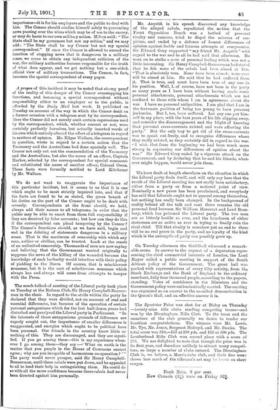Mr. Asquith in his speech disavowed any knowledge of the
alleged cabals, repudiated the notion that the Front Opposition Bench was a hotbed of personal rivalry and rancour, tried to dispel the miasma of sus- picion, and ended by a defence of honest differences of opinion against feeble and fatuous attempts at compromise. Sir Edward Grey supported "my friend Mr. Asquith" with regard to the war and to all he had said that afternoon. He went on to strike a note of personal feeling which was not a little interesting. Sir Henry Campbell-Bannerman had stated that he felt none of the cabals had been aimed at him. "That is absolutely true. None have been aimed; none ever will be aimed at him. He said that he had suffered from it. That is true, and must have been true of any one in his position. Well, I, of course, have not been in the party as many years as I have been without having made some personal attachments, personal attachments which are not confined to those with whom I am in agreement about the war. I have no personal antipathies. I am glad that I am in the fortunate position of being too young to have personal jealousies. But I, too, have suffered. Let any one put him- self in my place, with the best years of his life slipping away, and consider the discouragement and the blight of knowing that personal cross-currents existed and were affecting the party." But the only way to get rid of the cross-currents was to speak out freely, and to recognise differences where they really existed, as they certainly did in regard to the war.
I wish that from the beginning we had been much more strong in expressing our differences of opinion about the war." Sir Edward Grey ended by a vigorous attack on the Government, and by declaring that he and his friends, what- ever might happen, would never join them.






































 Previous page
Previous page